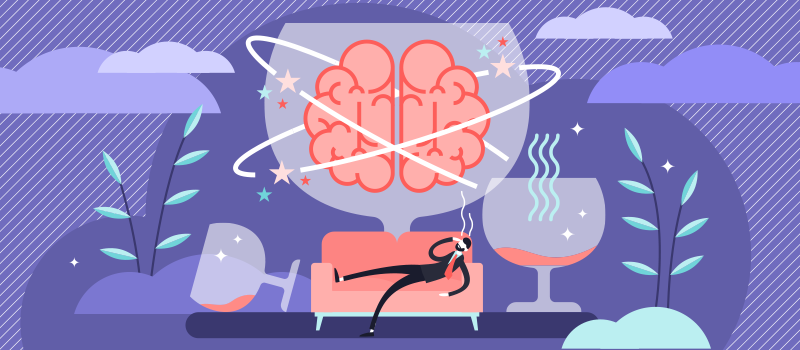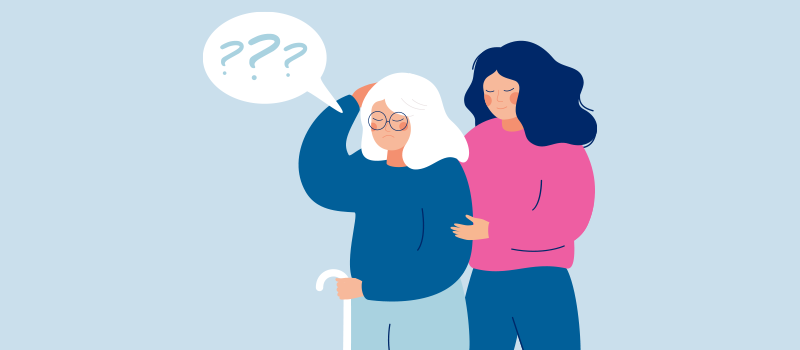What’s the Buzz
The Bee Healthy Blog
What Are The 7 Stages of Dementia?

Dementia is not a specific condition but an umbrella term to describe a decline in cognitive function and mental acuity due to changes in brain cells. Alzheimer’s disease is the most common type of dementia. There are other types of dementia, such as vascular dementia, Lewy body dementia, frontotemporal dementia, and mixed dementia.
People with a dementia diagnosis have problems with memory, communication, attention, focus, concentration, reasoning, judgment, and problem-solving.
Healthcare professionals discuss dementia in stages to help care providers understand what to expect in terms of symptoms and plan coping strategies. The different stages also provide guidelines to determine the best treatments for a dementia patient. Please continue reading to learn more about dementia stages.
What are the 3 main stages of dementia?
Early stage dementia
In the earliest stages of dementia, a person can function independently and has minimal care requirements. Things like appointment reminders, pill boxes, and to-do lists can help a person with early dementia remain independent. Safety needs to be considered, and supervision may be needed for any tasks that cannot be performed safely alone. These early stages of dementia are a good time to make plans for the future in terms of financial and legal matters.
Middle stage dementia
In the middle stages of dementia, there is a moderate decline in cognitive function and a gradual loss of independence. People with middle dementia require prompts and reminders for activities of daily living such as bathing, dressing, and preparing food, and more hands-on assistance as dementia progresses. Communication can become challenging, and caregivers should be patient and speak slowly. It is no longer safe for the person to drive or be alone, so supervision and transportation must be arranged in the middle stage.
Late stage dementia
In the later stages of dementia, patients require 24-hour assistance and supervision, including help getting into and out of bed and changing positions in bed if bedridden. Food can become hard to swallow in the late stages and may need to be cut into smaller pieces or pureed. In very late-stage dementia, a person becomes 100% dependent on caregivers and cannot live alone. Families unequipped to care for a person in this late stage may need to employ a professional caregiver or move the person to a nursing home that provides dementia care.
What are the seven stages of dementia?
Medical professionals use the Reisberg Scale or the Global Deterioration Scale for Assessment of Primary Degenerative Dementia (simply called the GDS) to assess the level of cognitive decline in dementia patients. This scale divides dementia into seven stages as follows:
Stage 1: No cognitive decline
People with no dementia symptoms are considered stage 1. There is no memory loss or need for memory care in this stage, and a person functions normally.
Stage 2: Very mild cognitive decline
This stage is characterized by mild cognitive impairment, such as misplacing keys or forgetting names. It is frequently not noticeable to family members or healthcare providers. Very mild cognitive decline is considered a normal part of the aging process and is also called age-associated memory impairment.
Stage 3: Mild cognitive decline
In the mild cognitive decline stage, loved ones begin to notice increasing forgetfulness, more frequent episodes of confusion or getting lost, trouble concentrating, difficulties finding the right words, and decreased work performance. A person can still function independently with this level of mild decline. Stages 1 through 3 are called the pre-dementia stages.
Stage 4: Moderate cognitive decline
In this dementia stage, a person forgets recent events, has difficulty concentrating and completing tasks, cannot travel alone to new places, has problems with managing finances and complex tasks, and may withdraw from friends and social activities. People in the moderate cognitive decline stage are often in denial about their symptoms.
Stage 5: Moderately severe cognitive decline
In this stage of dementia, there is a moderately severe decline with severe memory loss, including forgetting their address, phone number, date, time, or where they are. Dementia symptoms worsen, and patients in this dementia stage have declining physical abilities, requiring help with activities of daily living such as bathing and dressing.
Stage 6: Severe cognitive decline
This stage of severe dementia is characterized by an inability to function without help, forgetting the names of family members, forgetting recent events and major events from the past, difficulty speaking, trouble counting down from 10, incontinence (loss of bladder control), personality changes, emotional changes including mood swings and anxiety, delusions, and compulsions.
Stage 7: Very severe cognitive decline
This is the final stage of dementia where there is a very severe decline. Signs of end-stage dementia include an inability to speak or walk, loss of motor skills, 100% dependence on caregivers, and need for 24-hour care and supervision.
How long do the 7 stages of dementia last?
The average duration of the seven stages of dementia is as follows:
- Stage 1: Not applicable
- Stage 2: Unknown
- Stage 3: 2 to 7 years
- Stage 4: 2 years
- Stage 5: 1.5 years
- Stage 6: 2.5 years
- Stage 7: 1.5 to 2.5 years
How quickly does dementia progress?
Dementia is progressive and gets worse over time, typically over several years. It is difficult to predict how a person’s dementia will progress from mild dementia to moderate dementia to moderately severe dementia and beyond. In some people, the disease progresses rapidly after a dementia diagnosis, while in others, there is a gradual decline in cognitive functioning over several years. It depends on several factors, including the underlying cause and a person’s medical history. Every person experiences the seven stages of dementia differently, but most people share the symptoms.
How long do dementia patients live?
According to the Alzheimer’s Association, the average life expectancy for dementia patients is as follows:
- Alzheimer’s disease: 8-10 years
- Vascular dementia: 5 years
- Dementia with Lewy bodies: 6 years
- Frontotemporal dementia: 6-8 years
Life expectancy may be less for people who receive a dementia diagnosis in their 80s or 90s. A small number of people may live longer, up to 20 years, after being diagnosed with dementia.
References:











SOCIAL